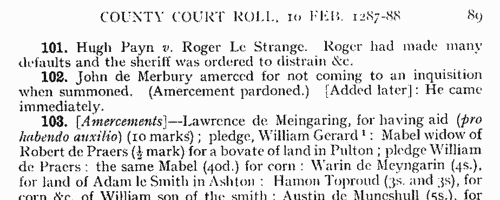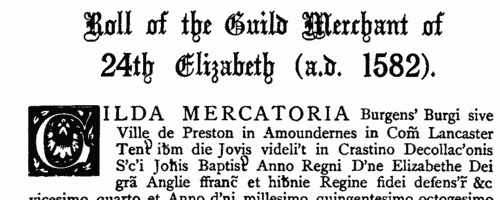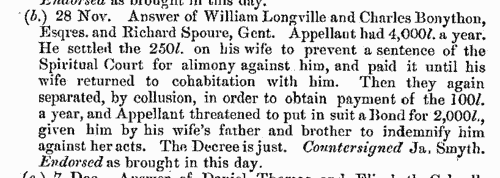Lyngard Surname Ancestry ResultsOur indexes 1000-1999 include entries for the spelling 'lyngard'. In the period you have requested, we have the following 6 records (displaying 1 to 6): Buy all | | | Get all 6 records to view, to save and print for £24.00 |
These sample scans are from the original record. You will get scans of the full pages or articles where the surname you searched for has been found. Your web browser may prevent the sample windows from opening; in this case please change your browser settings to allow pop-up windows from this site. Lancashire Assizes
(1202-1285)
All the surviving records of the assizes held by the royal justices in eyre (itinerant) in Lancashire during this period were extracted by colonel John Parker and published by the Lancashire and Cheshire Record Society from 1904. The justices not only tried all civil actions outstanding on their advent, pleas of the crown and common pleas, but also interrogated the juries of each wapentake and borough as to the Capitula Itineries, the Articles of the Eyre, inquiring into the king's proprietary rights, escheats, wardships, and questions of maladministration. Only a dozen complete rolls survive for this period; but Appendix I (pp. 218-253) gathers together from the Patent Rolls of the reign of Henry III (1216-1272) a schedule of Lancashire assizes for which justices were assigned; and Appendix II (306-342) adds the fines and amercements before the justices during that reign, as recorded on the Pipe Rolls.LYNGARD. Cost: £4.00.  | Sample scan, click to enlarge

| Cheshire Court Rolls
(1259-1290)
Civil and criminal cases for most of Cheshire were handled by the county courts. Here we have the county court rolls for November 1259 to August 1260, December 1281 to September 1282, and December 1286 to September 1289. The city of Chester exercised its own jurisdiction, and here we have crown pleas and presentments from 1287 to 1297. The royal manor of Macclesfield in the east of the county had three independent jurisdictions - the hundred, forest and borough. Royal justices in eyre dealt with civil and criminal cases from the hundred and forest during their yearly visits, and here we have records from 1284 to 1290. Also covered by this index is an Inquest of Service in Time of War in Wales of 1288, listing knight's fees in the county. LYNGARD. Cost: £4.00.  | Sample scan, click to enlarge

| Burgesses of Preston, Lancashire, and other members of Preston guild merchant
(1397-1682)
Freedom of the borough of Preston was necessary to trade in the town. The guild merchant maintained rolls of the burgesses, which were renewed every Preston guild, held every twenty years. The surviving rolls from 1397 to 1682 were edited by W. Alexander Abram, and published by the Lancashire and Cheshire Record Society in 1884 (volume ix). Each roll contains, firstly, a list of In-Burgesses, i. e., burgess inhabitants of the town, with the names of any adult sons eligible by way of inheritance to the freedom; then Foreign Burgesses (Burgenses Forinseci), i. e., those persons living outside the town who had acquired the freedom, plus the names of any adult sons; finally, there is a list of those who were not burgesses by inheritance, but had purchased freedom of the town. The only women to appear in these lists are three ladies in 1397, who were perhaps widows of burgesses. The text covers the rolls for the guilds merchant held in 1397 (20 Richard II: pages 1 to 7), 1415 (7 Henry V: 7-11), 1459 (37 Henry VI: 11-15), 1542 (34 Henry VIII: 15-19), 1562 (4 Elizabeth: 20-31), 1582 (24 Elizabeth: 31-46), 1602 (44 Elizabeth: 46-65), 1622 (20 James I: 65-94), 1642 (18 Charles I: 94-123), 1662 (14 Charles II: 123-159), and 1682 (34 Charles II: 160-202).LYNGARD. Cost: £4.00.  | Sample scan, click to enlarge

| House of Lords Proceedings
(1690-1691)
Private bills dealing with divorce, disputed and entailed estates: petitions, reports and commissions: naturalisation proceedings.
LYNGARD. Cost: £4.00.  | Sample scan, click to enlarge

| Boys at Eton
(1441-1698)
King Henry VI founded a college at Eton in Buckinghamshire in 1440, 'to the praise, glory and honour of the Crucified, the exaltation of the most glorious Virgin His mother, and the establishing of holy Church His bride'. From this foundation has evolved the modern public school. Sir Wasey Sterry compiled a register for the college from 1441 to 1698, from a variety of surviving records, and including groundwork from his 'A List of Eton Commensals' of 1904, and R. A. Austen-Leigh's 'A List of Eton Collegers' of 1905. This resulting 'Eton College Register' was published in 1943. Because of the variety of underlying materials, the entries vary greatly in depth: some names survive only as a surname of not too certain date. In the fullest entries, the surname (often with a variant spelling) is given first, in bold, followed by the years of entry and leaving. The christian name is given next; then birthplace, and name of father. The initials K. S. (King's Scholar) indicate a scholar on the foundation. There will then follow a summary of the man's career, death, burial and probate; and the sources for the information, in italics, at the end of the entry.LYNGARD. Cost: £4.00.  | Sample scan, click to enlarge

| Merchants and traders in Newcastle-upon-Tyne
(1515-1898)
The society of Merchant Adventurers of Newcastle-upon-Tyne consisted of those who had obtained freedom of the city (allowing them to trade there) by birth as a son of, or apprenticeship, to a freeman: and within that, freedom of one of the three 'trades', i. e. boothman, draper or mercer. F. W. Dendy prepared extracts from the merchant adventurers' records, the second volume, published by the Surtees Society in 1899 containing extracts from the minute books relating to the history of the merchants' court, an account of the long-standing dispute between the Newcastle company and the London company, some extracts relating to the relations between the Newcastle company and the Eastland Company (who had a monopoly of the trade with Russia and the Baltic), copies of the oaths used by the Newcastle company, the London company and the Eastland Company, and (pages 185 to 381) a list of the apprentices enrolled in, and of the freemen admitted to, the Newcastle company. This list is arranged in a table of seven columns: Name of Apprentice; Name of Father of Apprentice and Observations (particularly, instances where an apprentice is passed over to a new master during his apprenticeship); Master; Boothman (B.), Draper (D.) or Mercer (M.); Date of Indentures: Enrolment: Admission. All the dates are normalised to New Style, i. e. to the modern calendar. Finally, there is a list of sons and apprentices of members who, having thus acquired the right of freedom of the city, took up the freedom, but did not assume the freedom of any of the three trades. The index covers all the contents of the volume, not just the apprentice and freemen lists.LYNGARD. Cost: £4.00.  | Sample scan, click to enlarge

|
Research your ancestry, family history, genealogy and one-name study by direct access to original records and archives indexed by surname.
|








